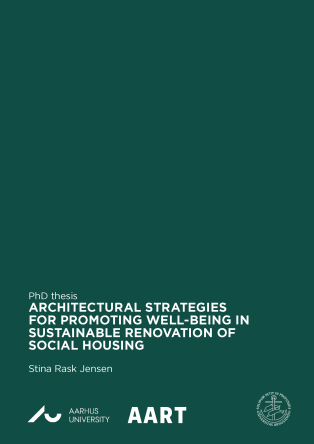Architectural strategies for promoting well-being in sustainable renovation of social housing
Nøgleord:
Social value, social housing, well-being, Social value creation, architecture, architectural transformation, energy renovation, sustainable renovation, environmental value creationSynopsis
The post-war multi-family social housing (MSH) stock faces extensive renovation over the coming years. These
prospects represent a significant potential for implementing energy savings while updating the housing stock to
better support the well-being of the residents.
The two agendas are mutually dependent. The reductions needed to reach a CO2-neutral society calls for extensive
energy renovations. These renovations are likely to dramatically change the built environment and thereby the
human perception of it. On the positive side, extensive energy renovation may also represent an opportunity to
add value for the residents that go far beyond the energy reductions in themselves.
Therefore, energy savings cannot be treated as an isolated matter. The thesis builds on the assumption that a more
holistic approach to sustainability is needed to promote long-term sustainable renovation solutions.
In this connection, it is key to focus on the early design phases, as this is where defining decisions are made, and
the ability to influence a project is highest. Nevertheless, the early stages also represent a high level of complexity
as many concerns are to be addressed simultaneously amongst a large group of stakeholders. In recent years, different initiatives have been proposed to meet this complexity and promote a more sustainable
development of the building sector. However, the thesis has identified a gap in existing initiatives when it comes
to supporting the architect’s role as a promoter of well-being as part of the early phases of sustainable renovations of MSH. Especially, promoting traditionally “softer,” more qualitative well-being themes as part of sustainable
renovation appears under-researched.
Based on the established knowledge gap, the thesis addresses the following research question: “How can resident well-being be promoted by architects in the early design phases of interdisciplinary sustainable renovation processes?”
The research question is investigated through three different objectives. A mixed-methods research design is
applied to shed light on these objectives.
Objective 1: Focuses on articulating synergies between energy savings and improved resident well-being in renovation from an architectural perspective. Based on a rereading of architectural theory and evaluation theory, the thesis proposes a new conceptual framework for this purpose. The framework may be considered a contribution to the field in its own right as a vocabulary for articulating the documented impact of renovation efforts. It further forms the theoretical foundation for the remaining objectives of the thesis.
Objective 2: Focuses on identifying examples that renovation measures can impact resident well-being in a
broad understanding, and that this can form synergies with energy savings. Based on architectural analysis of
completed projects, empirical studies, and a literature review, the thesis identifies such examples. It proposes
a categorization into “well-being themes,” which may be addressed in conjunction with energy savings. The
identified themes are: “The sensuous space,” “The safe space,” “The social space,” “’My’ space,” “The including
space,” and “The functional space.”
The well-being themes exemplify that a broad range of well-being aspects may be influenced as part of sustainable renovation of MSH.
Objective 3: Focuses on communicating the identified insights on potentials for documented impact back into
the early stage renovation practice – focusing on “softer” well-being themes. Based on a research through design
study, a literature review, and intermediate focus group interview, the thesis proposes three concepts for informing
the process. The three concepts are: metrics intended for computer simulation, a catalog of impact cases, and
supplementing the catalog of impact cases with examples of economic valuation. The proposed concepts should
not be considered “neither or” but supplementary ways of communicating knowledge, which may bring value to
the process depending on the application context. The perspective is to further develop and test the concepts
in collaboration with practitioners in ongoing renovation projects.
The three objectives and related research findings constitute three strategies for promoting well-being in sustainable renovation of social housing. By proposing these strategies, the aim is to contribute to a development where the evaluation of well-being in a broad sense becomes a fully integrated part of more holistically sustainable renovation practices – hopefully leading to more long-term sustainable renovation solutions.

